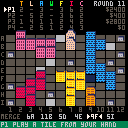PICO-8 adaption of the 1964 strategic boardgame Acquire. The objective of Acquire is to earn the most money through investing in and developing hotel chains.
Controls
- Left/right arrow keys, select an option (tile, stocks, etc).
- [o] / z to show (toggle) the reference stocks information.
- [x] / x to play the selected option.
Rules
Watch this short (6:55) video on how to play Acquire
The objective of Acquire is to earn the most money through investing in and developing hotel chains (as identified by T, L, A, W, F, I, C).
Players can found hotel chains, buy stocks in them, merge chains which will give bonus payouts and expand chains to increase their stock value. Each player starts with $6000 in cash and 6 location tiles, hidden from other players. You are player 1 (P1) and will be playing against 3 AI players (P2-P4). A random player starts.
Players take turns, performing these phases:
1) Place a location tile on the board. This might found a new chain, grown an existing chain, cause a merger of two or more chains or have no special effect.
2) Buy stocks. A player can buy up to 3 stocks in founded chains.
3) Get a new random title to replace the played one. Now it is the next player's turn.
Placing tiles
Each tile on the board has up to 4 neighbors (orthogonally). Depending on them the following happens:
1) If it has no neighbors, the tile will just be placed.
2) If the neighbor(s) are not part of a chain, you will found a new chain.
3) If the neighbor(s) are from the same chain (with optional additional non-chain tiles), you will grow the chain. Growing the chain size might cause the stock price to go up.
4) If the placed tile connects two or more chains, this will cause a merger.
A tile can not be place if it would found a new chain, but there are no more chains available, or when it would cause a merger witth a safe chain (when it has 11 or more tiles). If all 6 tiles in your hand can't be placed, you can discard the full hand to get a new set of 6 tiles.
Founding a new chain
When you found a new chain, by placing a tile next to a chainless tile on the board, you get to choose which hotel chain will be formed. Note that the chains have different stock prices, see the reference chart [o]. You get a single stock as reward.
Merging chains
When you merge chains, by placing a tile to connect two or more chain tiles on the board, the larger chain will take over the other(s). If multiple chains have the same size, the tile placer gets to pick which chain is the acquirer. A chain with 11 or more tiles is "safe" and can't be taken over in mergers.
Payout of bonuses: The largest stockholders will get 10x the stock price of the acquired chain. The second largest stockholder will get 5x the stock price. If there is a tie, the bonuses will be split. If there is only a single stockholder, they will get both bonuses.
Disposition of stocks: Stockholders can chooose what they want to do with the acquired stocks, from a combination of trade, sell and keep.
Keep the player will retain the stocks, which might become valuable if a new chain under the acquired chain gets created.
Sell the player can sell some or all of their stock for the current stock price.
Trade the player can exchange two of the acquired stocks for one of the acquiring stocks.
After this all the acquired chain's tiles are replaced with the acquiring chain.
When there are multiple mergers, the largest chain takes over the second largest chain first. After which the next-largest gets merged in, etc.
Buying stocks
After placing your tile, you can buy 1, 2 or 3 stocks of chains that are on the board. The price will depend on the size of the chain and some chains are more expensive than others. Up to 25 stocks for a single chain can be sold.
Ending the game
The game ends when one of the chains has 41 or more tiles, there are no more tiles left to draw or all chains on the board are safe (have 11 or more tiles).
When this happens, the primary and secondary bonuses are paid out to the stockholders. Then all shares are sold. The player(s) with the highest amount of cash wins.
[Please log in to post a comment]








